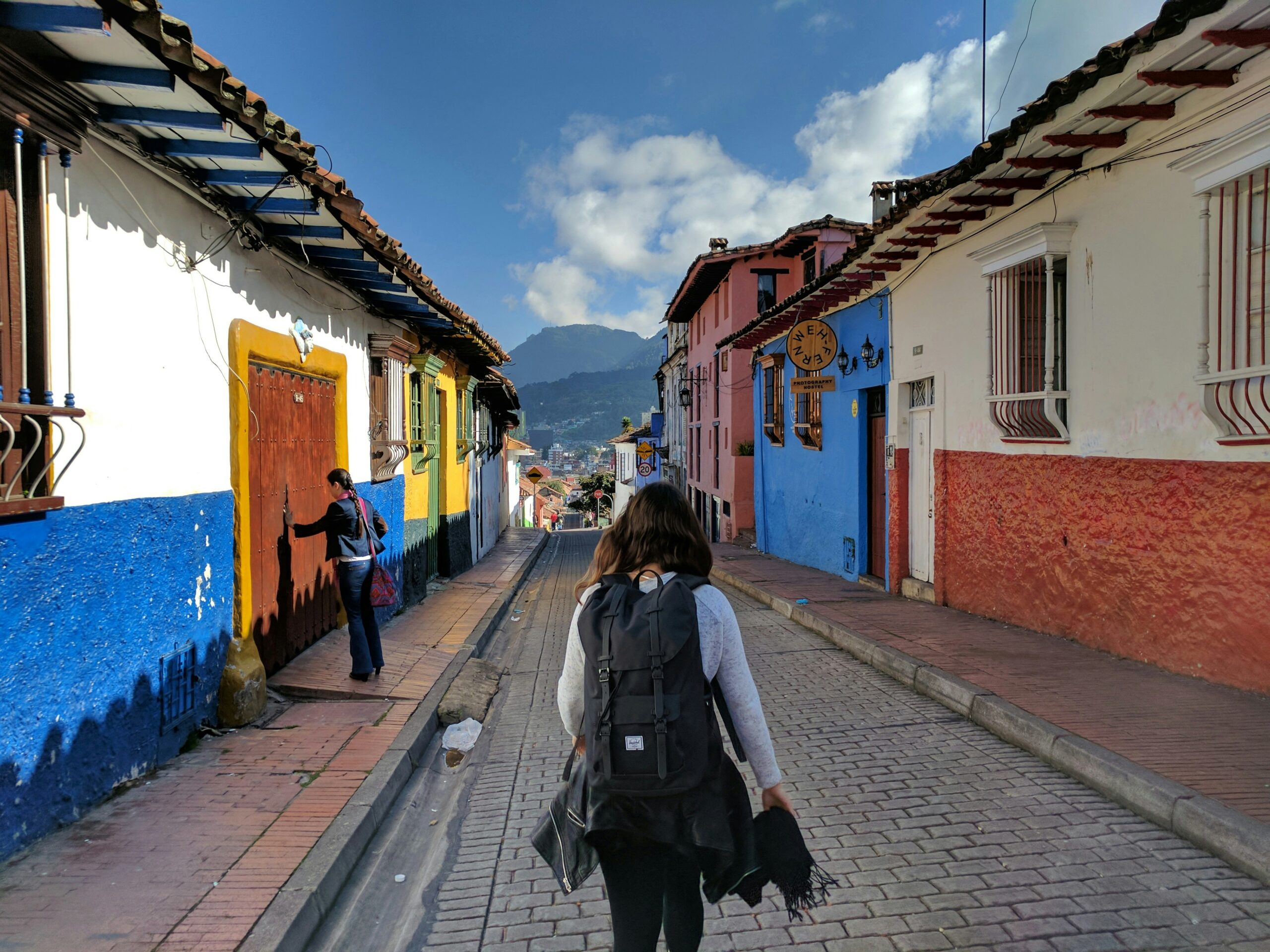
20 Colombian Spanish Phrases to Impress Native Speakers
Why Learn Colombian Spanish Phrases?
Learning Spanish can be challenging, but if you’re looking to connect more deeply with native speakers, learning local phrases is essential. In Colombia, the Spanish spoken has a distinct charm with a range of colloquial expressions that will help you sound like a local. These Colombian Spanish phrases will not only make your conversations smoother but also give you insights into the culture.
To improve your skills, we recommend the book Colombian Spanish Stories for Beginners, which integrates many of these phrases into real-life contexts. This book is perfect for learners looking to enhance their fluency in a fun and engaging way.

Colombian Spanish Phrases You Need to Know
¡Qué más!: A friendly greeting, meaning “How are you?”
This phrase stands out as one of the most common ways to greet someone in Colombia. Unlike the formal ¿Cómo estás?, ¡Qué más! carries a casual and friendly tone. People often use it among friends or acquaintances, implying a laid-back inquiry about how the other person is doing. It’s similar to saying “What’s up?” in English.
Ejemplo: “¡Qué más, parce! Hace rato que no te veía, ¿cómo te ha ido?”
Parce: A term for “friend” or “buddy.”
In Colombian Spanish, parce serves as the go-to term for “friend,” much like compa or amigo in other Spanish-speaking countries. This informal term works well between close friends or even between newcomers wanting to establish a friendly rapport.
Ejemplo: “Parce, ¿qué vas a hacer este fin de semana? Vamos a salir a tomar algo.”
Chévere: Used to describe something cool or awesome.
This versatile word allows Colombians to express approval or excitement about a wide range of subjects. Whether discussing an event, a person, or even an idea, using chévere shows your appreciation for what you’re talking about.
Ejemplo: “El concierto de anoche estuvo chévere, me encantó la música y el ambiente.”
Juepucha: A milder form of a stronger curse word.
Juepucha acts as a softened version of the expression hijueputa, which carries much stronger connotations. People use it when they feel surprised, frustrated, or angry, but in a less aggressive manner. It’s comparable to saying “darn” instead of something harsher.
Ejemplo: “¡Juepucha! Olvidé las llaves de la casa y ahora no puedo entrar.”
Colombian Party Culture
Rumba: Means “party.”
In Colombia, rumba refers to lively parties or celebrations that involve music, dancing, and plenty of socializing. This word closely ties to the country’s vibrant nightlife and festive culture.
Ejemplo: “Este sábado hay una rumba increíble en la casa de mi amigo, vamos a bailar toda la noche.”
Guaro: Short for aguardiente, a popular alcoholic drink.
Colombians use guaro to refer to aguardiente, a strong alcoholic beverage made from sugarcane. People often consume it at social gatherings, especially during parties and celebrations. Knowing this term is essential for anyone experiencing Colombian nightlife or social events.
Ejemplo: “Trajimos una botella de guaro para la fiesta, así que la rumba va a estar buenísima.”
Estar enguayabado: Describes having a hangover.
If you’ve ever woken up after a night of partying feeling less than your best, you might find yourself enguayabado. This phrase specifically refers to the unpleasant aftereffects of drinking too much alcohol. It’s widely used in Colombia to describe hangovers, making it essential for anyone who might indulge in local nightlife.
Ejemplo: “No puedo levantarme, estoy enguayabado después de la fiesta de anoche. Necesito un café para recuperarme.”
Fashion and Social Expressions
Mañe: Something tacky or out of fashion.
People use mañe to describe things considered low-quality, out of style, or overly flashy in a tasteless way. Although often associated with clothing, it can apply to various subjects, including decorations, behavior, or even speech.
Ejemplo: “Ese tipo de ropa es muy mañe, ya nadie se viste así.”
Paila: Refers to a bad or unfortunate situation.
Paila serves as a versatile word for Colombians to describe unfortunate events or bad luck. This casual expression works well for commenting on everything from minor inconveniences to more significant problems.
Ejemplo: “Se me dañó el carro en medio de la carretera, qué paila. Ahora tengo que esperar horas para que llegue la grúa.”
Vaina: A versatile word that can mean “thing” or “issue.”
Vaina acts as one of those catch-all words that can fit many different contexts. It can refer to an object, a situation, or even a problem. The meaning largely depends on the context of the conversation, making it a flexible term in Colombian Spanish.
Ejemplo: “Esa vaina que me contaste ayer está muy rara, no sé si deberías involucrarte.”
Ready to master Colombian Spanish and impress native speakers?
10 More Phrases to Sound Like a Local
Once you’ve mastered the basics of Colombian Spanish, incorporating more colloquial phrases can significantly enhance your conversational skills. Here are ten additional Colombian Spanish phrases that will help you navigate everyday conversations with native speakers and immerse yourself in the vibrant culture:
1. Camellar
- Meaning: To work hard or put in a lot of effort into something.
- Ejemplo: “Esta semana me tocó camellar hasta tarde para terminar el proyecto.”
- Context: This term derives from the image of a camel, which symbolizes hard work as it carries heavy loads across deserts. In everyday conversations, people commonly use camellar to express the effort put into various tasks—be it work, school, or chores. If you’ve had a particularly tough day, saying, “Hoy camellé mucho,” resonates well with locals, showing that you understand the work ethic prevalent in Colombian culture.
2. Chino/a
- Meaning: A colloquial term used to refer to a child.
- Ejemplo: “El chino de mi hermana es muy travieso.”
- Context: This affectionate term frequently appears in discussions among family and friends about children. It adds a personal touch when talking about kids. However, be mindful that chino may have different connotations in other Spanish-speaking countries, sometimes referring to a person of Asian descent. Thus, context matters, and using it in informal settings within Colombia is key.
3. Llevar del bulto
- Meaning: Refers to when someone bears the brunt of a situation, often unfairly or unexpectedly.
- Ejemplo: “Siempre que hay problemas en la oficina, yo soy el que lleva del bulto.”
- Context: This phrase captures the essence of being unfairly blamed or having to deal with the consequences of someone else’s actions. It’s perfect for expressing frustration humorously, especially in a workplace setting. For instance, if your colleagues leave you to handle their responsibilities, saying you’re “llevando del bulto” can lighten the mood while highlighting the unfairness of the situation.
4. Tener filo
- Meaning: A way of saying you’re hungry.
- Ejemplo: “Después de todo el día sin comer, tengo un filo impresionante.”
- Context: This phrase literally means “to have an edge,” but in Colombia, it creatively conveys hunger. Friends commonly use it in casual conversations. Next time you find yourself in Colombia feeling peckish, instead of the more formal Tengo hambre, try saying, “Tengo filo” to blend in with the locals and show that you’re familiar with their colloquial expressions.
5. Hablar mierda
- Meaning: Means to talk nonsense or exaggerate.
- Ejemplo: “Deja de hablar mierda, sabes que eso no es cierto.”
- Context: This phrase provides a casual way to call out someone for speaking foolishly or exaggerating a story. It suits informal conversations, allowing you to express skepticism about someone’s claims or stories. Just keep in mind that it’s not appropriate for formal settings, but in friendly gatherings, it can add humor to your interactions.
6. Estar tragado/a
- Meaning: To be in love or infatuated with someone.
- Ejemplo: “Juan está tragado de su compañera de clase.”
- Context: This vivid expression illustrates the overwhelming feeling of being captivated or infatuated with someone. It serves as a colorful way to describe romantic feelings and can be used among friends discussing crushes or new relationships. If you find yourself smitten with someone, sharing that you’re tragado can spark relatable conversations about love and infatuation.
7. Coger el bus
- Meaning: To catch the bus.
- Ejemplo: “Tengo que salir rápido para coger el bus a tiempo.”
- Context: In Colombia, people widely accept the verb coger to mean “to take” or “to catch,” especially when referring to public transport. Be aware that in other Spanish-speaking countries, coger can have different meanings, so context is essential. Using this phrase correctly shows your understanding of local vernacular, making it easier to navigate the public transportation system in Colombia.
8. La plena
- Meaning: Used to emphasize that something is true or authentic.
- Ejemplo: “Te lo digo, es la plena, lo vi con mis propios ojos.”
- Context: This phrase frequently appears to stress the truthfulness of a statement, akin to saying “for real” in English. It proves effective when trying to convince someone about the authenticity of your claims or experiences. When you want to assure someone that you’re not exaggerating, adding la plena can reinforce your point and enhance your credibility in the conversation.
9. Estar pilas
- Meaning: Describes someone who is alert or sharp.
- Ejemplo: “Tienes que estar pilas si quieres entender la clase.”
- Context: This expression proves invaluable when discussing someone’s level of attentiveness or quickness to grasp concepts. It’s often used in educational or professional settings, where staying focused is crucial. By telling someone to estar pilas, you’re encouraging them to pay attention and be ready to engage, making it an important phrase for anyone in a learning environment.
10. Estar llevado/a
- Meaning: Refers to being in a bad state, whether physically, emotionally, or financially.
- Ejemplo: “Después de esa experiencia, estoy llevado.”
- Context: This phrase describes a variety of challenging situations, from feeling exhausted after a long day to dealing with emotional stress or financial hardship. It allows for genuine expressions of struggle, making it a great phrase to use when discussing life’s ups and downs with friends or during informal chats.

How to Keep Improving with Colombian Spanish Stories for Beginners
One of the best ways to immerse yourself in Colombian Spanish phrases is by reading stories written in the local dialect. Colombian Spanish Stories for Beginners is an excellent resource for learners of all levels. The book provides short stories that use the phrases we’ve discussed in real-life scenarios, making it easier for you to understand and practice in context.
Ready to master Colombian Spanish and impress native speakers?






